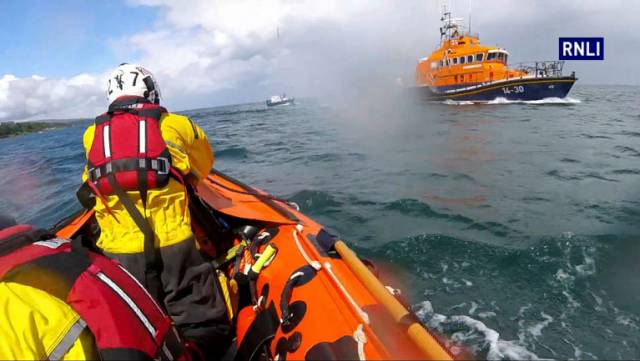The most recent launch took place on Friday last, 23 June at 11pm. Larne's all-weather lifeboat Dr John McSparron and inshore lifeboat Terry launched on request of Belfast Coastguard to reports of two overdue kayakers. Both boats completed a search north from Larne with the kayakers located safe and well at Drumnagreagh.
Larne RNLI launched both lifeboats on Sunday 11 June to a 36ft yacht experiencing engine difficulties near the entrance to Larne Lough. On arrival, a volunteer lifeboat crew member was transferred onto the yacht to check the three on board were safe and well. A towline was then established before the lifeboat brought the yacht into the safety of Larne harbour.
Only 2 days later (Tuesday 13 June) Larne inshore lifeboat was launched following reports of an over-turned kayak at Carnfunnock. A multi-agency search took place but nothing was found indicating a false alarm with good intent.
The volunteer crew pagers sounded again on Sunday 18 June. Both Larne lifeboats launched to assist a vessel with two adults and two children on board that was taking on water in Drains Bay. The all-weather lifeboat was stood down by Belfast Coastguard after it was confirmed that the vessel had made it ashore. The inshore lifeboat continued to Carnfunnock to ensure no assistance was required and all onboard the vessel were safely ashore.
On Monday 19 June the lifeboat crew were requested to launch by Belfast coastguard at 8.40pm after reports that five teenagers were stranded on rocks at Blackarch. Larne RNLI immediately launched both lifeboats and was on scene within minutes. After putting the group into lifejackets, the lifeboat crew carefully transferred them onboard the inshore lifeboat. They then made the short trip out to the all-weather lifeboat where they were then transferred onboard and their condition assessed. Members of the Larne Coastguard were also on scene and provided valuable ground support during the operation.
Larne RNLI Coxswain Frank Healy said: 'This has been a busy few weeks for our volunteer crew who drop everything to answer the call when their pagers sound. Our crews are highly trained and skilled, and excellent team work ensured that all five launches were completed safely and successfully.'
Coming into the summer season the RNLI is promoting its national drowning prevention campaign, Respect the Water. It is aimed at promoting safety advice to all who visit the coast. The RNLI want everyone to enjoy the water, but also want people to recognise its dangers and never underestimate its power. This year, Respect the Water will focus on simple floating skills that could save a life. If you find yourself unexpectedly in the water, he advice is to float to increase your chances of survival. If you see someone else in trouble in the water, call 999 or 112 and ask for the Coastguard.
Allan Dorman, Larne RNLI Lifeboat Operations Manager advises: ‘For those who are planning to visit the sea please check the weather and tides before heading to the coast, tell someone where you're going and when you expect to be back. Wear a lifejacket and always carry a means of calling for help. And if you see someone in danger in the water, call 999 and ask for the Coastguard.’































































